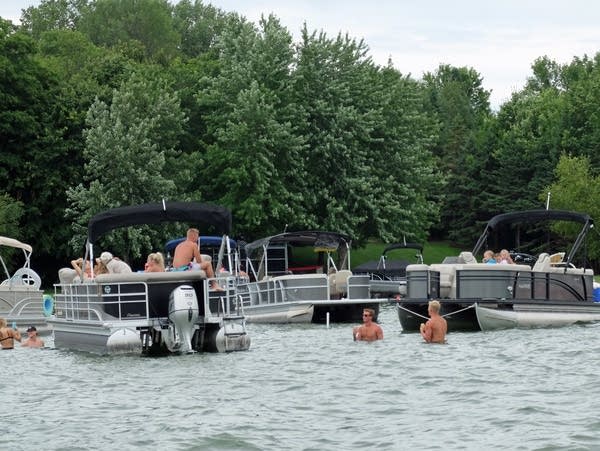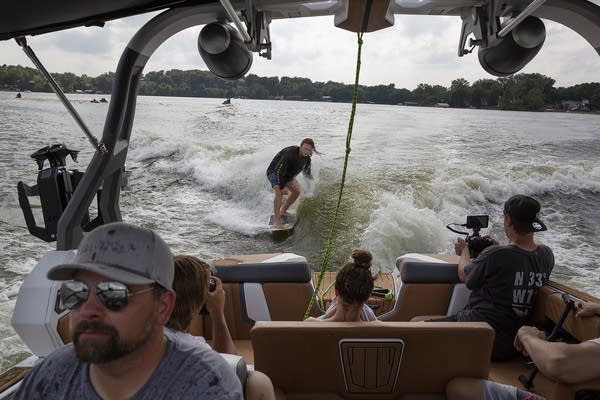Amid rush to Minn. lakes, calls to require boater education get louder

Go Deeper.
Create an account or log in to save stories.
Like this?
Thanks for liking this story! We have added it to a list of your favorite stories.
Nisswa Marine sales manager Jeremy Wiczek saw firsthand how the COVID-19 pandemic has spurred Minnesotans to spend more time on lakes and rivers.
In the past two years, interest in boating has grown by leaps and bounds, Wiczek said, especially among families.
"We went through this period of, ‘How are we going to sell boats?’ to, ‘Oh wow, this is an amazing opportunity for people to spend more time with their family,’” he said.
The brisk sales mean some people buying boats didn't grow up on the water — they’ve had to learn the ropes, to use a nautical term. Wiczek spends a lot of time educating boat buyers on how to safely operate their new purchase, along with proper etiquette.
Turn Up Your Support
MPR News helps you turn down the noise and build shared understanding. Turn up your support for this public resource and keep trusted journalism accessible to all.
Out on the lake, he’s been known to offer respectful advice to other boaters who are driving too fast or too close to other boats. Most of the time, they just don't know any better, Wiczek said.

"It's not necessarily that they're trying to break rules, or trying to be a bad apple in the tree out there on the lake,” he said. “I think they just don't know."
Wiczek and some other dealers think it's time for Minnesota to start educating people on the basics of boating before they get out on the water.
Minnesota is among the top five U.S. states with the most registered boats — topping 830,000 last year. But it's one of the few states that doesn't require any training or education for adult boaters.
Since 2019, Minnesota has added more than 16,000 motorized watercraft, said Adam Block, state boating law administrator for the Department of Natural Resources.
More boats — from paddleboards and kayaks to powerful speed boats — are bringing more pressure to Minnesota lakes, he said.
"Nobody is against a person's ability to go out and recreate,” Block said. “We just have to find a way of how can we do it that is respectful to all the other users on any given lake, because there's many."
Minnesota requires youth, ages 12-17, to complete a watercraft safety course to legally operate a boat. There’s a growing consensus among a diverse coalition, including some industry groups and lake associations, that it's time to add similar requirements for adults.
The state already requires safety training for snowmobiles, ATVs and dirt bikes for operators born after a certain date.
There are more boats in Minnesota than any of those, but boats behave the least like a traditional motor vehicle, Block said.
"Compared to an ATV, a boat doesn't have brakes. And if you're not underway, you generally get no response from the steering,” he said. “That's a concept that people have a hard time visualizing sometimes, if they haven't had exposure to it."
Today's boats are also bigger, more powerful and hold more people, providing lots of opportunity for distraction, Block said.
"There's not many motor vehicles where you can have a dozen people in your vehicle with you,” he said. “If you are, you're driving a bus, and you have a different level of training and a license. But that's not true in a pontoon."
There were 17 boat-related fatalities in Minnesota last year, the most since 2015 — an indication that boat safety is trending in the wrong direction, Block said. Alcohol intoxication is the leading contributing factor in boating accidents.

Lake impacts
Many lake residents also support requiring boater education, tired of ignorant or careless boaters driving too fast or too close to the shore, docks or other boats.
Some lake associations also have raised concerns about the growing popularity of wakesurfing boats, designed to create a large wave to surf behind. Large wakes have the potential to causing shore erosion and other damage.
A recent study by the University of Minnesota found that wakesurfing boats would need to stay as far as 500 feet from shore in order for their waves to dissipate to the same level as those from traditional boats.
A bill that would have required wakesurfing boats to keep at least 200 feet from shore failed to gain traction at the Legislature last year.
Many lake advocates still hope to see restrictions on wakesurfing, but believe an education requirement has a better chance of passage, and could help address some of the conflicts.
Jeff Forester, executive director of Minnesota Lakes and Rivers Advocates, envisions a training course that would cover not just safety, but also the ecological impacts of boating.
"When the wake leaves the back of their boat, they don't think about where it's going, or what it might do,” Forester said. “We need to recreate in a way that doesn't degrade the resource over time."
The Minnesota Coalition of Lake Associations supports requiring boater education, said board member Tom Watson, a seasonal resident of the popular Whitefish Chain of Lakes north of Brainerd.
Watson said requiring boater education wouldn’t solve all problems, but has the support from groups that don’t always agree.
“Even though it may be baby steps, at least it's moving forward,” he said.
There are limitations, Watson said, including how effectively the DNR could enforce the requirement.
Also unclear is whether it would apply to resorts, rental companies or boat-sharing clubs, which have been growing in popularity.
Confident boaters
It might seem surprising that the boating industry would be on board with more regulations.
But Matt Gruhn, president of the Marine Retailers Association of the Americas, said educated boaters are more likely to be safer, lifelong boaters who feel comfortable out on the water.
"It raises your confidence, and it lowers the risk of mistakes – bumping into a dock, or bumping into another boat or something like that,” Gruhn said.
Jill Sims, Great Lakes policy and engagement manager for the National Marine Manufacturers Association, said with more people working from home, spending time at lake cabins and out on the water, there’s a collective interest in making boating safer.
“With that increased use, we want to keep people on the water,” she said. “We want to help them be safe on the water, and we want them to be a good steward of the water as well. So it just seems like the time is now.”
Wiczek thinks a few of his customers at Nisswa Marine might grumble about having to complete an online education course, but most won't mind.
"It's just going to be a collective path, I think, for everybody to have a better experience on the water,” Wiczek said.


